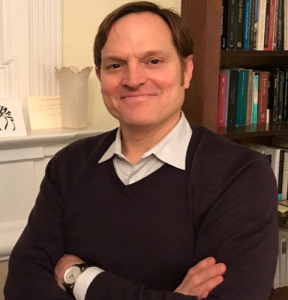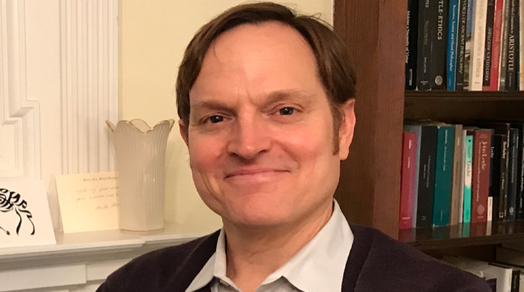By Jada Butler & Dondre Lemon
News Editor & Assistant News Editor
The new dean of the College of Liberal Arts and Sciences (CLAS), Nathaniel Bowditch, hired on August 11, 2017, is now in his second semester at LIU Post.
Bowditch has adjusted well to the new setting. “The best thing about LIU Post is the people; everyone is really helpful, generous and friendly,” he said. Bowditch wants to build a connection with the students, and his first step is by teaching his own class. “I want to know our students; that’s who we are serving and why we are here,” he said.

Nathaniel Bowditch, dean of College of Liberal Arts & Sciences
Bowditch is joined by his wife, Eden, who joined the university as an adjunct professor in the English department beginning this academic year. The CLAS long time secretary, Joan Ruckel, has also left the university this semester.
Bowditch, who was previously the dean of the school of humanities and social sciences at the American University in Cairo, is bringing some changes to CLAS. However, he doesn’t want to make changes just for the sake of making them. He wants to “identify a problem if there is one, and figure out a way for everyone to benefit from the changes.”
One of the changes being discussed is the merger of academic departments.
Several departments in the college may be consolidated, according to Bowditch. “We are thinking of consolidating, however nothing is finalized.” By merging departments together, the school has potential to grow, according to Bowditch.
At the beginning of the 2017-2018 school year, CLAS chairs were informed about the potential merger of their departments. Faculty members did not agree with the proposal. On Jan. 31, the faculty members of CLAS unanimously approved to present a two page document titled, “Faculty Resolution Opposing CLAS Consolidation” to the Faculty Council. In this document, the faculty expressed their concerns over the plan to consolidate 12 departments, and stated that “the administration has not demonstrated that it values the liberal arts and sciences or is committed to their survival,” and that “consolidation likely will result in fewer majors and minors, more frustrations for our students, and lower retention rates in the college.”
Not all faculty members oppose the department mergers. Sheila Gunther, a professor in the foreign language department, understands the necessity of the consolidation plan to bring the university to the twenty-first century. “This is not inherently bad and should ultimately make the university more cost efficient and stable,” she said.
“We should be asking ‘Are we structured in the best way we could be’,” Bowditch said. Bowditch and the CLAS faculty want to make sure that their programs are set up best for students, and organized well. “The idea is to make sure we have excellent programs, we are organized in the right way, we are offering what students want, are the departments set up in a way that is maximally productive for faculty to be collaborating with each other and working together,” he said.
The chairs of the English and philosophy departments have expressed a willingness to merge, yet nothing is finalized, according to Amy Freedman, chair of the political science department. “If consolidations are mandated, I have every reason to assume that political science will be merged with one or two additional departments. It is too soon to know what this will look like and how it will play out,” Freedman said.
This idea to consolidate departments comes shortly after the development of a new core-curriculum put together by the Thematic Core Curriculum committee, previously discussed in the article “Core Curriculum To Be Reduced” by Anand Venigalla in the Dec. 6 issue of The Pioneer. It also comes at a time when the administration has yet to honor their commitment to answer the serious charges raised in the faculty’s June 2017 report to the New York State Education Department (NYSED). This idea also comes before most departments have completed Academic Program Reviews, which faculty state in the document, “demonstrate that the only metric that counts is enrollment.”
A decision is yet to be made, and Bowditch and the CLAS faculty will continue to meet and discuss to ensure that “they are giving the students the best that we can.”







Be First to Comment